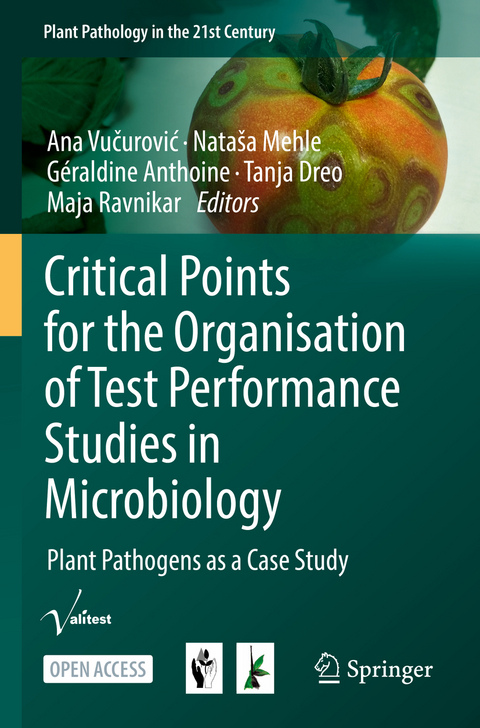
Critical Points for the Organisation of Test Performance Studies in Microbiology
Springer International Publishing (Verlag)
978-3-030-99813-4 (ISBN)
This open access book in the field of plant pest detection shows a constant demand in development and improvement of fast and reliable detection tools, especially for high-priority pests. This open access book describes and summarizes the whole process of the organization of test performance study (TPS) for these tools. The outcome of TPS, obtained through the evaluation of the performance of one or more diagnostic tests by several laboratories on defined samples, is the finding of the best performing test/s for particular pest and for specific uses. Nowadays the intensification of worldwide trade and associated controls increases the need for quality assurance accreditation and harmonization of laboratories practices. Therefore, such studies are very important, but, non-existent. Considering those facts, our goal was to develop guidelines, by using the data and experiences of involved partners, for further TPS in the field of plant health. Developed guidelines could be easily transferable to other microbiology fields.
lt;p> Ana Vucurovic is phytopathologist focused on the research of virus and fungal diseases of vegetables, field crops and ornamentals. She obtained her degree at the University of Belgrade-Faculty of Agriculture. Her main activities involves detection, identification and characterization of plant viruses and fungi, including quarantine and emerging pathogens. Her main research interest are virus disease of tomato, tobacco and cucurbits, and fungal diseases caused by Phytophthora, Fusarium and Alternaria species. She is involved in the WP1 of the Valitest project.
Natasa Mehle is a biologist, with a specialisation in novel diagnostic methods development for the detection of new emergent plant pathogens, the biology of plant viruses, viroids, and phytoplasma, and also interactions between plants and their pathogens. She is a responsible analyst of plant viruses, viroids and phytoplasma for the official detection of plant pathogens. She is also involved in research and detection services for samples from other countries. She is an active member of the EPPO Panel on viruses and phytoplasmas and she is working in the European reference laboratory for viruses, viroids and phytoplasmas. She led several training courses in the diagnosis of viruses, viroids and phytoplasma, and she was involved as a lecturer in several real-time PCR workshops in plant pathology (organized by NIB and Biosistemika). She has also experiences in the management and organization of test performance studies and proficiency tests for international audience. She is involved in the WP1 of the Valitest project.
Chapter1. Introduction.- Chapter 2. Description of the process of TPS organization.- Chapter3. Selection of pests and scope of TPS.- Chapter4. Selection of TPS organizers.- Chapter5. Selection of tests included in TPS.- Chapter6. Selection of TPS participants.- Chapter7. TPS workflow.- Chapter8. Analysis of TPS results data.- Chapter9. Reports and dissemination activities.- Chapter10. Conclusions.
| Erscheinungsdatum | 13.08.2022 |
|---|---|
| Reihe/Serie | Plant Pathology in the 21st Century |
| Zusatzinfo | XIV, 97 p. 1 illus. |
| Verlagsort | Cham |
| Sprache | englisch |
| Maße | 155 x 235 mm |
| Gewicht | 170 g |
| Themenwelt | Naturwissenschaften ► Biologie ► Botanik |
| Naturwissenschaften ► Biologie ► Mikrobiologie / Immunologie | |
| Schlagworte | Diagnosis • diagnostic laboratories • interlaboratory trial • open access • plant pest • test performance study |
| ISBN-10 | 3-030-99813-4 / 3030998134 |
| ISBN-13 | 978-3-030-99813-4 / 9783030998134 |
| Zustand | Neuware |
| Haben Sie eine Frage zum Produkt? |
aus dem Bereich


